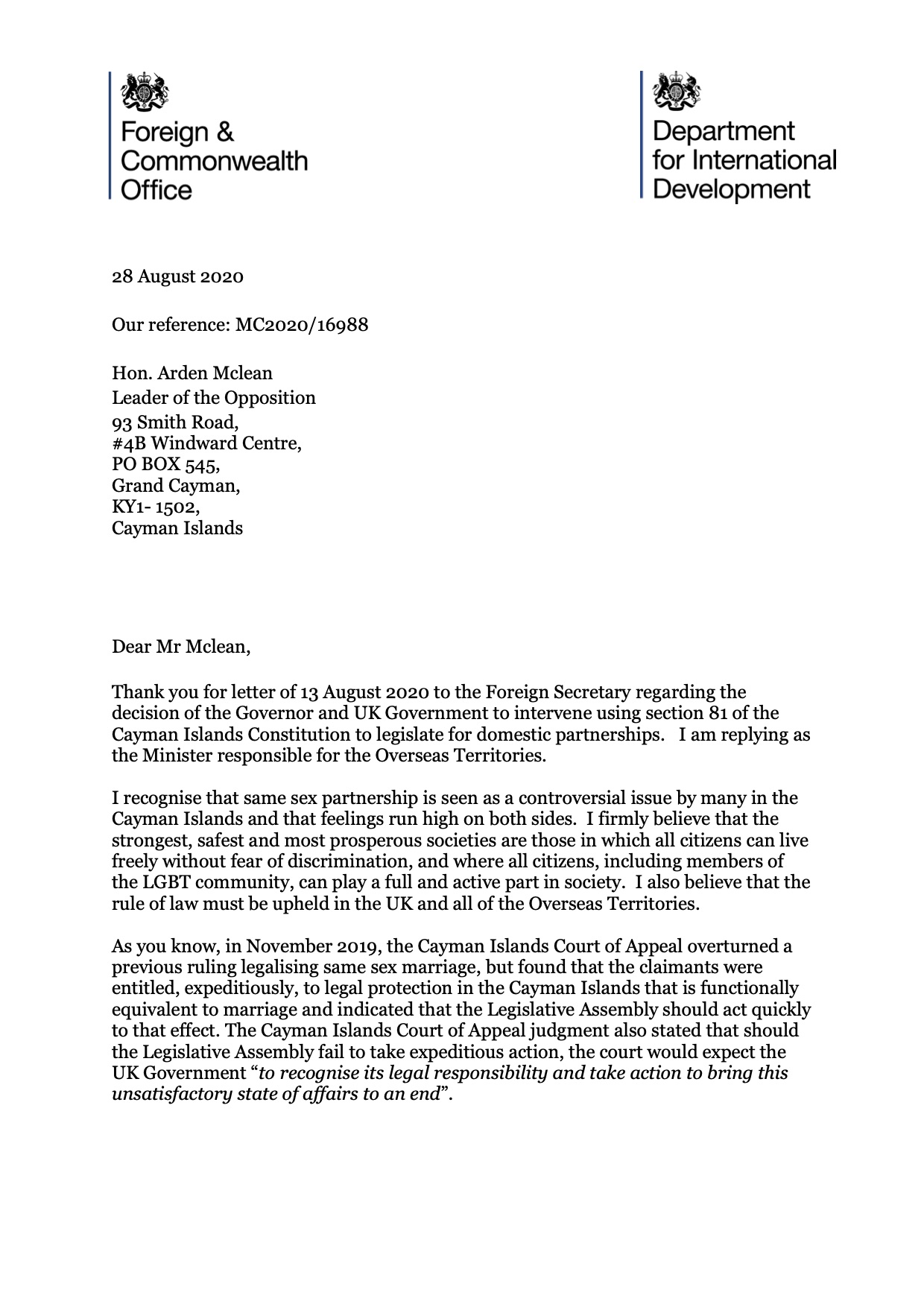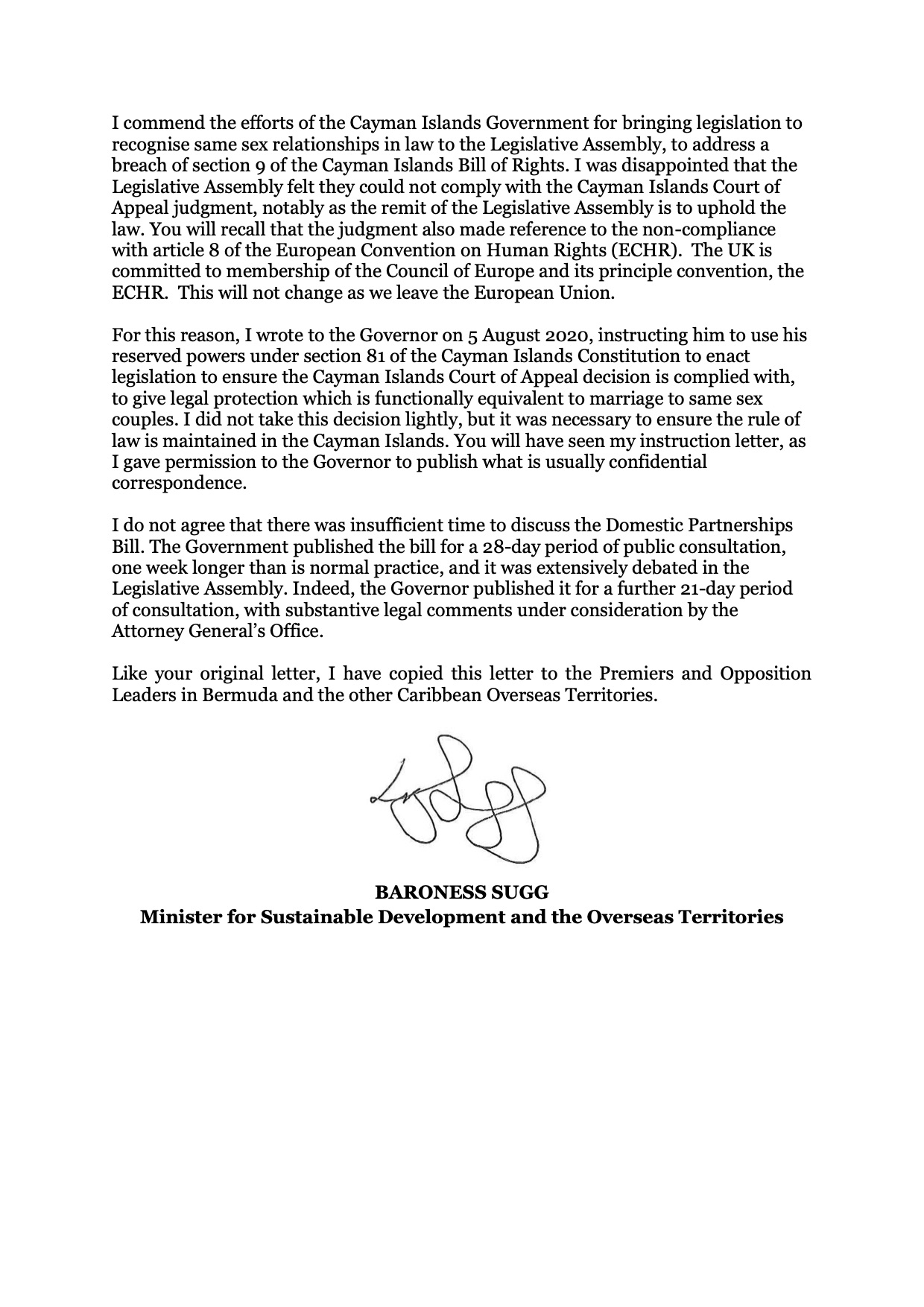Cayman: Governor’s statement on giving Assent to the Civil Partnership Law 2020 / Letter to L-of-O / Summary of changes
“In line with instructions from UK Ministers to use my reserved powers under s81 of the Constitution, I have today given Assent to the Civil Partnership Law and 11 consequential pieces of legislation.
“The 21-day consultation period ended on 31 August. The Attorney General’s Office, Deputy Governor and I have carefully considered all comments received. As a result a number of amendments were made to the draft legislation discussed by the Legislative Assembly. These were aimed principally at strengthening the effectiveness of the Legislation. As previously announced, the title has changed to Civil Partnership in response to feedback received. A number of pieces of consequential legislation have been updated to ensure they apply to those who enter civil partnerships. The changes to the law and the consequential legislation are set out in the attached document.
“I recognise that this issue is highly emotive and difficult for many people across our Islands. At the same time I have received a large amount of correspondence and direct representations in support of using s81 to bring this law into effect.
“UK Ministers instructed me to take this action to uphold the rule of law and comply with the Cayman Islands Court of Appeal Judgment in November 2019. The Court of Appeal declared that same sex couples were entitled, expeditiously, to legal protection in the Cayman Islands, which is functionally equivalent to marriage. The Court also declared that in the absence of expeditious action by the Legislative Assembly, they would expect the United Kingdom Government to recognise its legal responsibility and “take action to bring this unsatisfactory state of affairs to an end”.
“After the narrow vote on 29 July against the Domestic Partnership Bill, it was evident from my consultations with the Premier and others that there was no prospect of the Bill coming back to the Legislative Assembly, or if it did that it would be successfully passed. The UK therefore had no option but to step in to ensure we comply with the rule of law and international obligations under the terms of the European Convention on Human Rights.
“Today we will end the discrimination being suffered by Caymanians and others on our islands whilst protecting the institution of marriage. This action does not alter or undermine the strong Christian heritage and values of the people of the Cayman Islands. No-one is being asked to change their long-held beliefs.
“But what we are required to do is provide a legal framework functionally equivalent to marriage for same sex couples, from which heterosexual couples will also be able to benefit, should they so choose. That is necessary to comply with our own courts and our Constitution. The Government of the Cayman Islands and the Attorney-General have accepted that this is a legal requirement that cannot be ignored. As the Court of Appeal stated – that Cayman had such an obligation has been apparent for several years. An important principle in our Constitution and Bill of Rights is the protection of minorities. That principle protects all of us, now and in the future. We cannot pick and choose which rights are protected.
“I urge everyone to recognise that same sex couples have the right to legal and financial protection like everyone else. Accepting diversity and difference shows to the world that we are a caring community based on mutual respect, tolerance and equality for all.
“Let me also reiterate that Cayman retains full autonomy for domestic issues including in education and immigration. The UK fully respects Cayman’s autonomy in domestic affairs. Indeed this will be made even clearer in the package of constitutional changes that are likely to be adopted later this year.
“UK intervention in this manner is extremely rare. As Governor it is not a position I would ever have wanted to be in. Abolition of the death penalty in 1991 and legalising homosexuality in 2000 were previous examples where the UK intervened to ensure its legal and international obligations, in a British Overseas Territory, were upheld. It is wrong to suggest that the UK will seek additional pretexts for intervening.
“The law comes into effect once gazetted today. However, operationally the Civil Service will require a delay of 21 days before starting to accept and process applications for registration of civil partnerships.
“I am also making public today the response from Baroness Sugg to the Leader of the Opposition’s letter to the Foreign Secretary of 13 August.”
“I do hope that everyone on the islands can now move forward with their lives and come together as a community. Let us refocus our energies on pressing matters such as responding to the global pandemic, rebuilding our economy and protecting our environment.
END
Letter to Leader of Opposition



CIVIL PARTNERSHIP LAW AND CONSEQUENTIAL LAWS SUMMARY OF MAIN CHANGES AFTER CONSULTATION
A number of representations were made during the twenty-one days consultation period. The majority of responses were either in support of, or against, the Law. Some of the more relevant drafting suggestions have been accepted and resulted in changes to some of the provisions of the Law. The following are the main changes provided in the Law.
- The name of the legislation was changed to the “Civil Partnership Law” and the words “domestic partnership” and “domestic partner” were deleted throughout the Law and replaced by the words “civil partnership” and “civil partner” respectively. This was also done in the consequential legislation.
- Some of the other main amendments to the Civil Partnership Law are as follows-
- The Civil Partnership Law was amended to make it clear that where either of the parties to a civil partnership is under eighteen years of age, is not a widower or widow, and enters into a civil partnership under the Law without the consent required to enter into a civil partnership in accordance with the Law, the civil partnership shall be voidable.
- Part 3 deals with the notices of proposed civil partnerships and the issue of the relevant certificates or licences for such civil partnerships. Part 3 has been amended to bring the provisions closer in line with the provisions of the Marriage Law. The main changes are as follows-
- (a) a new section 7 was inserted which makes it clear that a civil partnership may be formalised under the authority of —
- (i) the Registrar’s or a Civil Registrar’s certificate issued under section 9;
- (ii) a special licence granted by the Governor under section 10; or
- (iii) a licence granted by the Deputy Governor under section 33 or 34;and without any such authority in the cases provided for in section 15.
- (b) Section 8 is amended to provide that upon receipt of a notice of an intended civil partnership, the Registrar or Civil Registrar, on being satisfied that the notice conforms to the requirements of this section, shall —1
- (a) a new section 7 was inserted which makes it clear that a civil partnership may be formalised under the authority of —
- (i) enter the particulars set out in the notice in the Civil Partnerships Notice Book; and
- (ii) display in a conspicuous and accessible place on a notice board in a public area in the Registrar or Civil Registrar’s office, a public notice of the intended civil partnership in the form as provided by the Registrar, and shall keep the notice so displayed for seven consecutive days after it has been put up.
- Section 18 which deals with grounds on which a civil partnership is void was amended to provide that a civil partnership is void where either party to the civil partnership did not validly consent to it, whether by consequence of fraud, duress, mistake, unsoundness of mind or otherwise.
- In Part 7, which deals with the registration of civil partnerships, the main difference relates to the search of the register in section 22. Section 22 has been amended to provide that the Registrar may-
- (a) allow a person or organisation that has an adequate reason for wanting access to the Civil Partnerships Register access to the Register; or
- (b) provide a person or organisation that has an adequate reason for wanting information from the Civil Partnerships Register, with information extracted from the Register.
- (a) the nature of the applicant’s interest;
- (b) the sensitivity of the information;
- (c) the use to be made of the information; and
- (d) any other prescribed factors.
- Part 9 was changed to provide for the appointment of Civil Registrars instead of Deputy Registrars. Similar to the Marriage Law, under section 29 the Governor may, from time to time, appoint and remove at pleasure such persons as the Governor thinks fit to be Civil Registrars for the purposes of the Law.Section 30 provides that a Civil Registrar shall, subject to the approval of the Governor, appoint in writing a fit person to act as the Civil Registrar’s deputy in case of illness or absence of the Civil Registrar. Part 16 of the Civil Partnership Law contains consequential and transitional provisions. Section 48 (previously clause 46) provides that until all necessary2
legislation is enacted to provide amendments consequential upon the enactment of the legislation, certain words and expressions in other legislation shall be read as the corresponding words or expressions provided in the table in that clause, unless the enactment is specifically amended.
Eleven consequential Laws are being enacted to provide for some of the most important family issues which will affect civil partnerships. Section 48 will provide transitional arrangements for other relevant laws.
Part 18 contains final provisions. Section 50 (previously clause 48) provides that the Governor, after consultation with the Premier, may make regulations generally for giving effect to the legislation.
The legislation which were published with the Domestic Partnership Bill (i.e. “consequential legislation”) and which will come into force immediately after the commencement of the Civil Partnership Law are as follows-
Adoption of Children (Amendment) Law, 2020
Evidence (Amendment) Law, 2020
Health Insurance (Amendment) Law, 2020
Immigration (Transition) (Amendment) (No.2) Law, 2020 Mental Health (Amendment) Law, 2020
National Pensions (Amendment) (No.2) Law, 2020
Penal Code (Amendment) Law, 2020
Protection from Domestic Violence (Amendment) Law, 2020. Public Service Pensions (Amendment) Law, 2020 Succession (Amendment) Law, 2020
Wills (Amendment) Law, 2020.
With the exception of the Protection from Domestic Violence (Amendment) Law, 2020, the Succession (Amendment) Law, 2020 and the Wills (Amendment) Law, 2020, the only changes which were made to the consequential Laws are amendments to align the terminology in those pieces of amending legislation with that which will be used in the Civil Partnership Law, 2020.
As it relates to the Succession (Amendment) Bill, 2020 and the Wills (Amendment) Law, 2020, a definition of “child” has been inserted. A definition of “parent” was also included in the Succession (Amendment) Law, 2020 to ensure that parents of children by virtue of a civil partnerships will be captured.
Friday, September 4, 2020





